
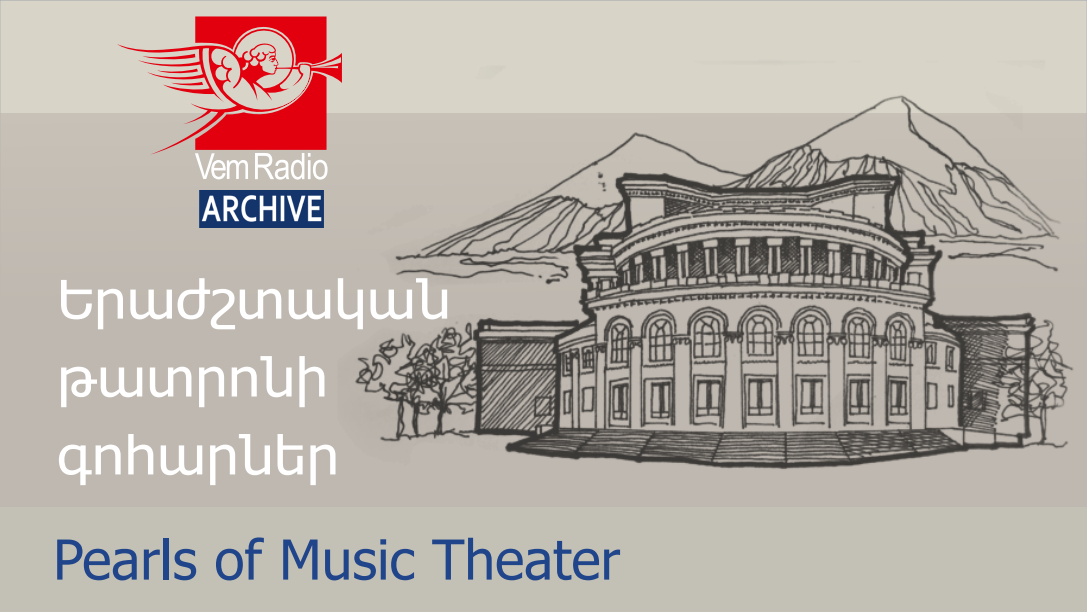
Pearls of Music Theater
The program broadcasts the best performances of famous operas, ballets, musicals, and operettas, presenting their plots and the history of their creation. Before each act, the corresponding part of libretto is read, which makes the listening experience more vivid and comprehensible.
- Author of the program: Inessa Khachatryan

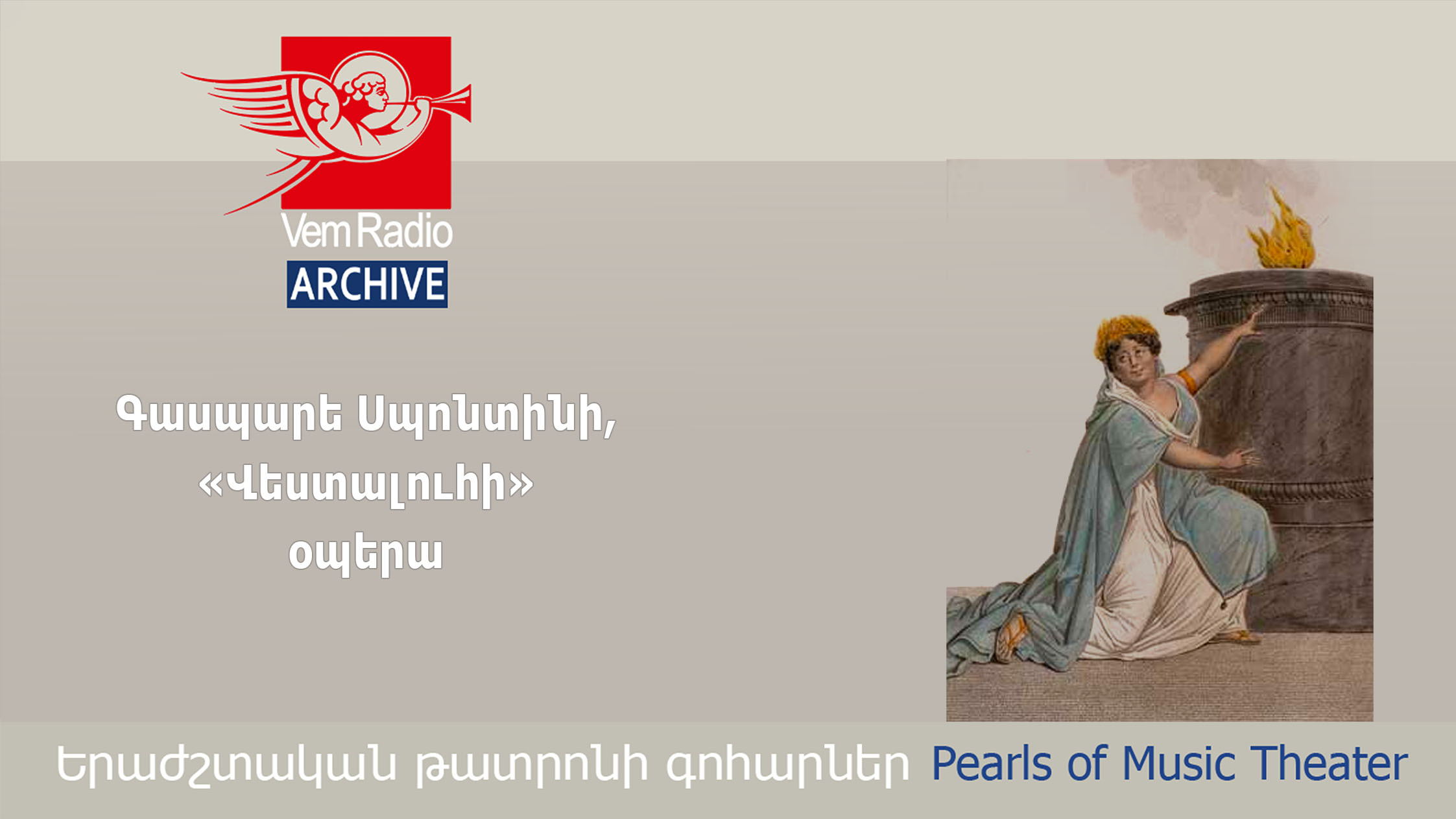
Gaspare Spontini, La Vestale
The libretto of this opera was written by Victor Étienne de Jouy and Michel Dieulafoy.
The opera was premiered on December 15, 1807, at the Paris National Opera in the presence of Empress Josephine. Despite the tendency to get rid of Italian influence in French music, the audience immediately appreciated this opera as a masterpiece.

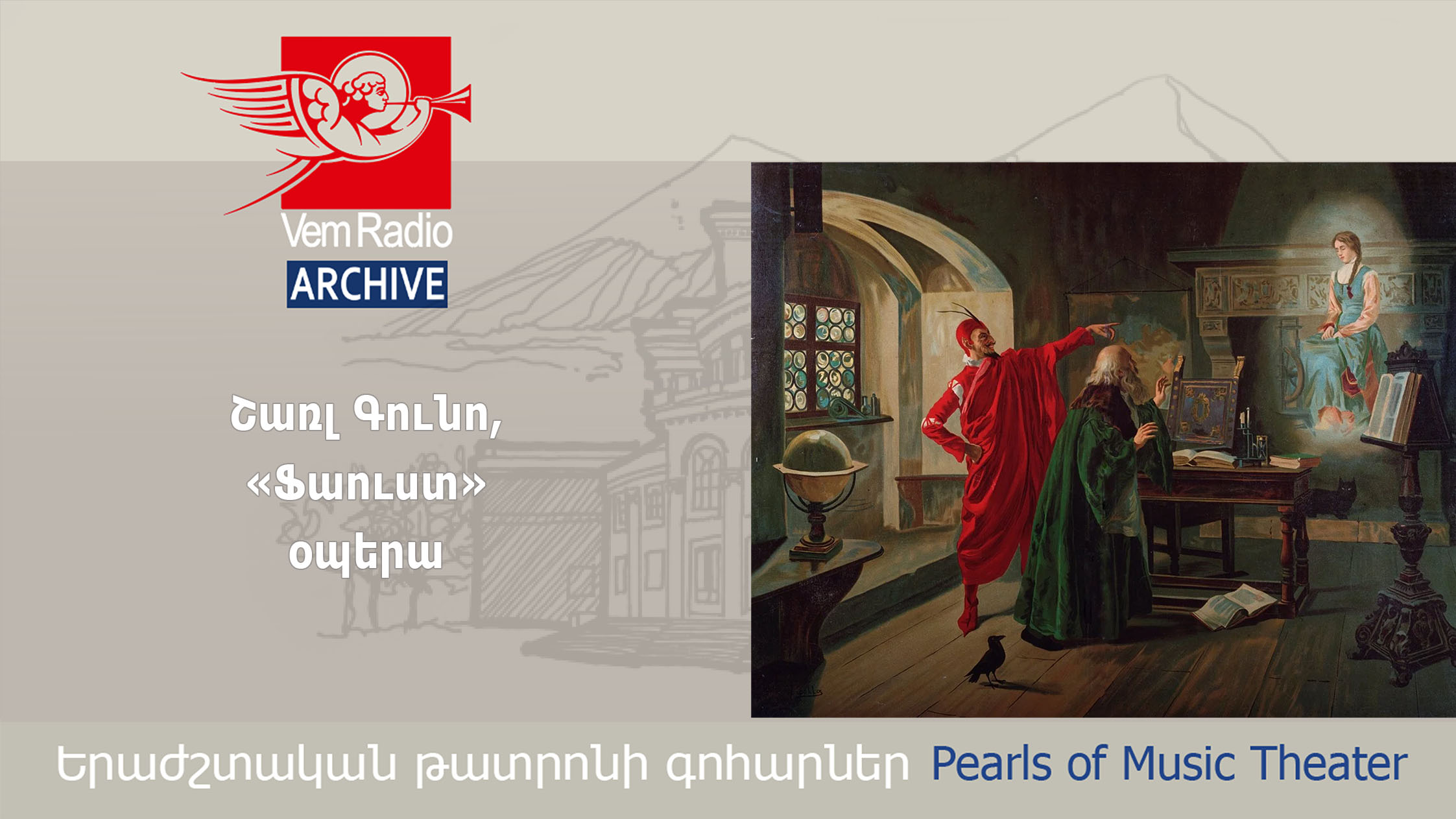
Charles Gounod, Faust
The plot of the Opera Faust is borrowed from the first part of Goethe's tragedy of the same name, which is itself based on a common German medieval legend.
The libretto was written by Paul Jules Barbier and Michel Antoine Florentine Carre.
The first performance of the opera took place in Paris, in Théâtre-Lyrique, on March 19, 1859.

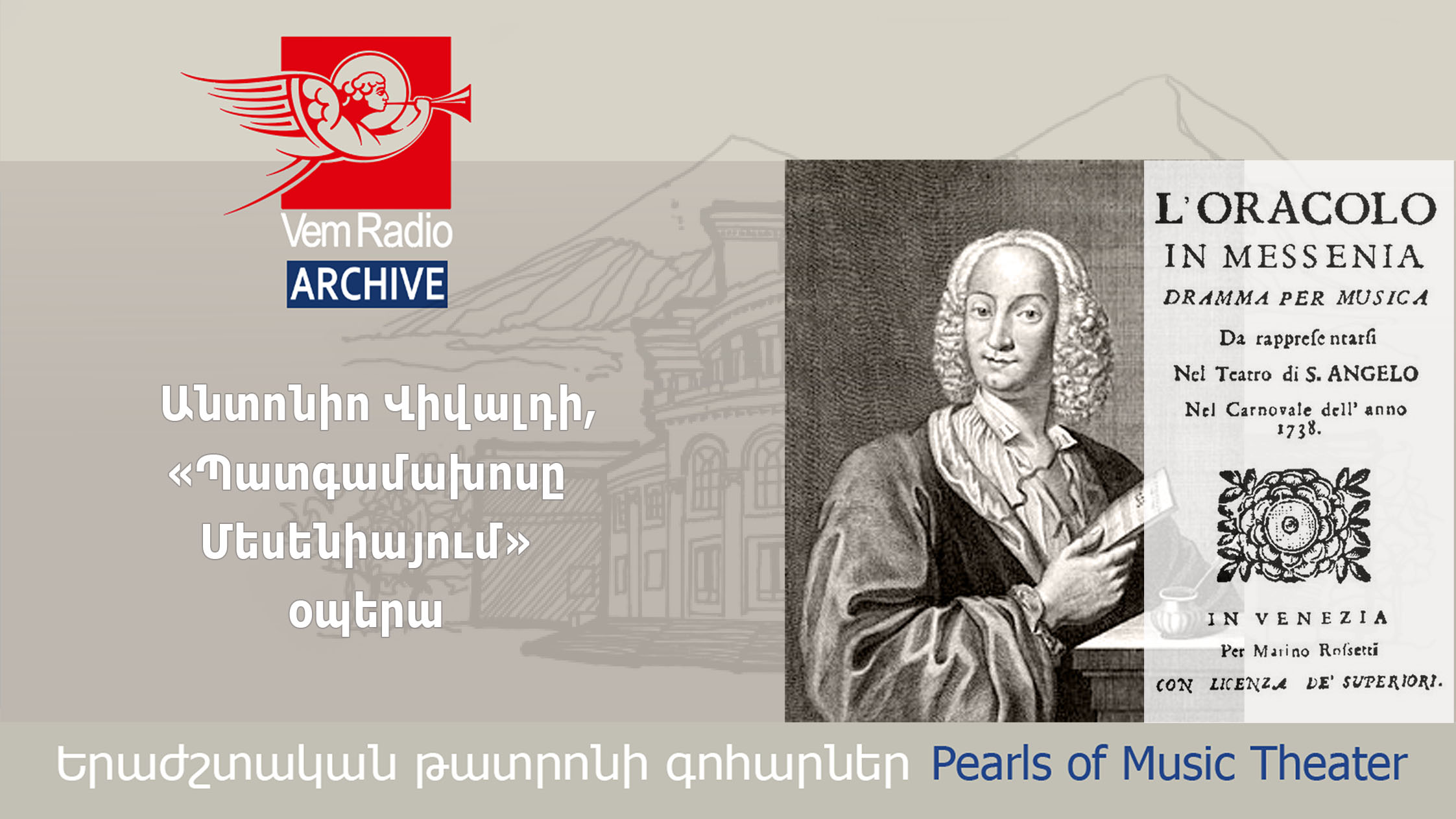
Antonio Vivaldi, Oracle in Messenia
Libretto of the Opera "Oracle in Messenia" was written by the Italian poet Apostolo Zeno. In 1738, the opera was a great success in Venice. Thanks to the perseverance of Vivaldi's friends, in 1742, the opera was also premiered in Vienna.
This work previously considered lost has been recovered on the basis of the libretto of the Vienna premiere, which has been recently found in the Library of Congress in Washington. This important and difficult task has been successfully carried out by violinist and conductor Fabio Biondi who has used the technique of "pasticcio" in reconstructing the lost passages of the original opera.

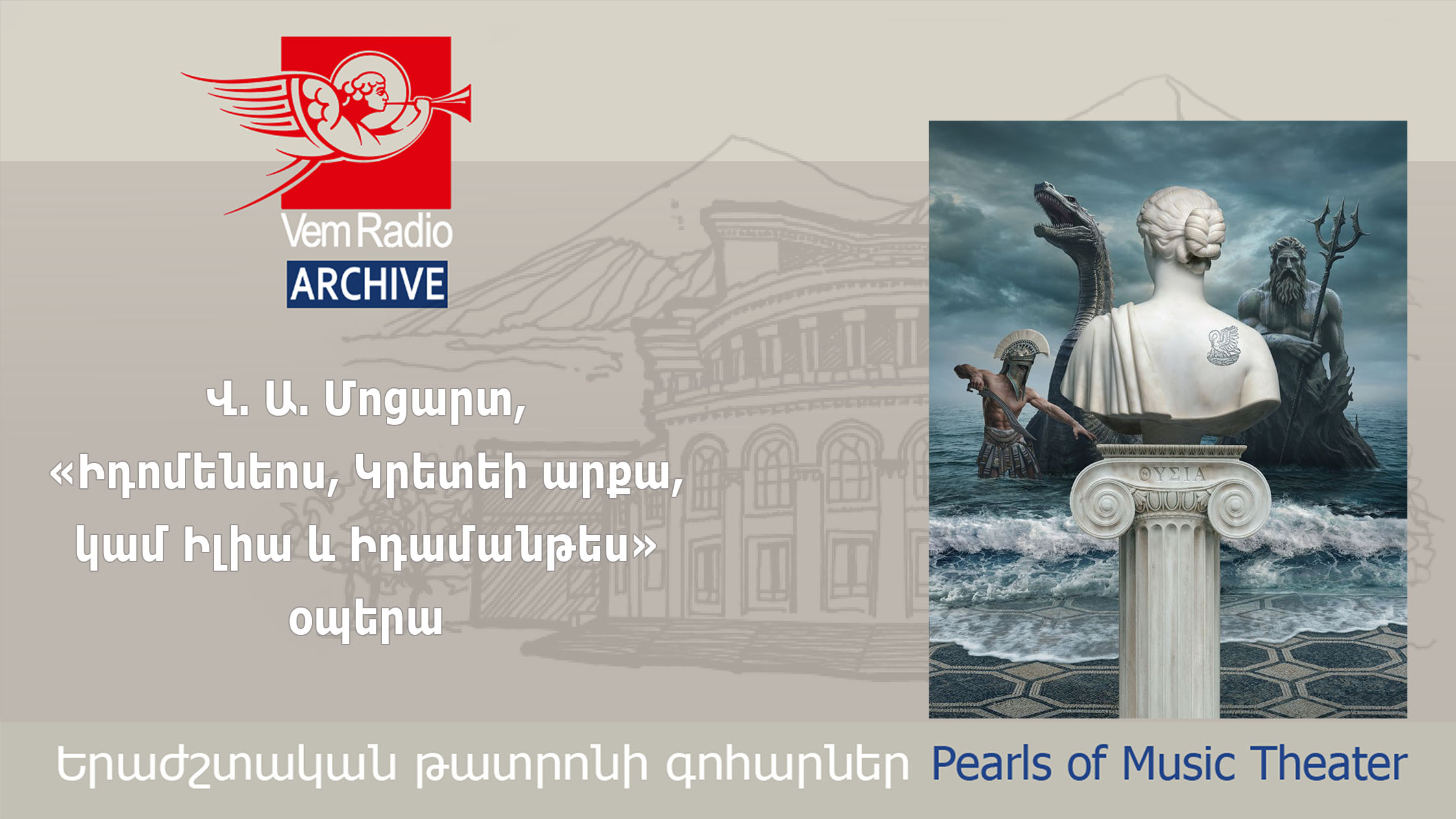
Wolfgang Amadeus Mozart, Idomeneo, King of Crete, or, Ilia and Idamante
This opera was composed by commission of the Bavarian and Palatinate elector Karl Theodor. The myth of Idomeneo had already been used in musical theater. In 1712, a five-act opera by the famous composer André Campra was presented in Paris that was written to the libretto of poet and playwright Antoine Danchet, an author of 12 tragedies and librettos, mainly on classical subjects. His "Idomeneo" is full of tragic events and ends in a bloody denouement. The Abbot Giambattista Varesco, chaplain of the Archbishop of Salzburg, translated the text of this libretto into Italian and adapted it to the specifics of the opera seria. He changed the five acts into three acts and the bloody denouement into a happy one.
The opera was premiered on January 29, 1781, at the National Theater of Munich.

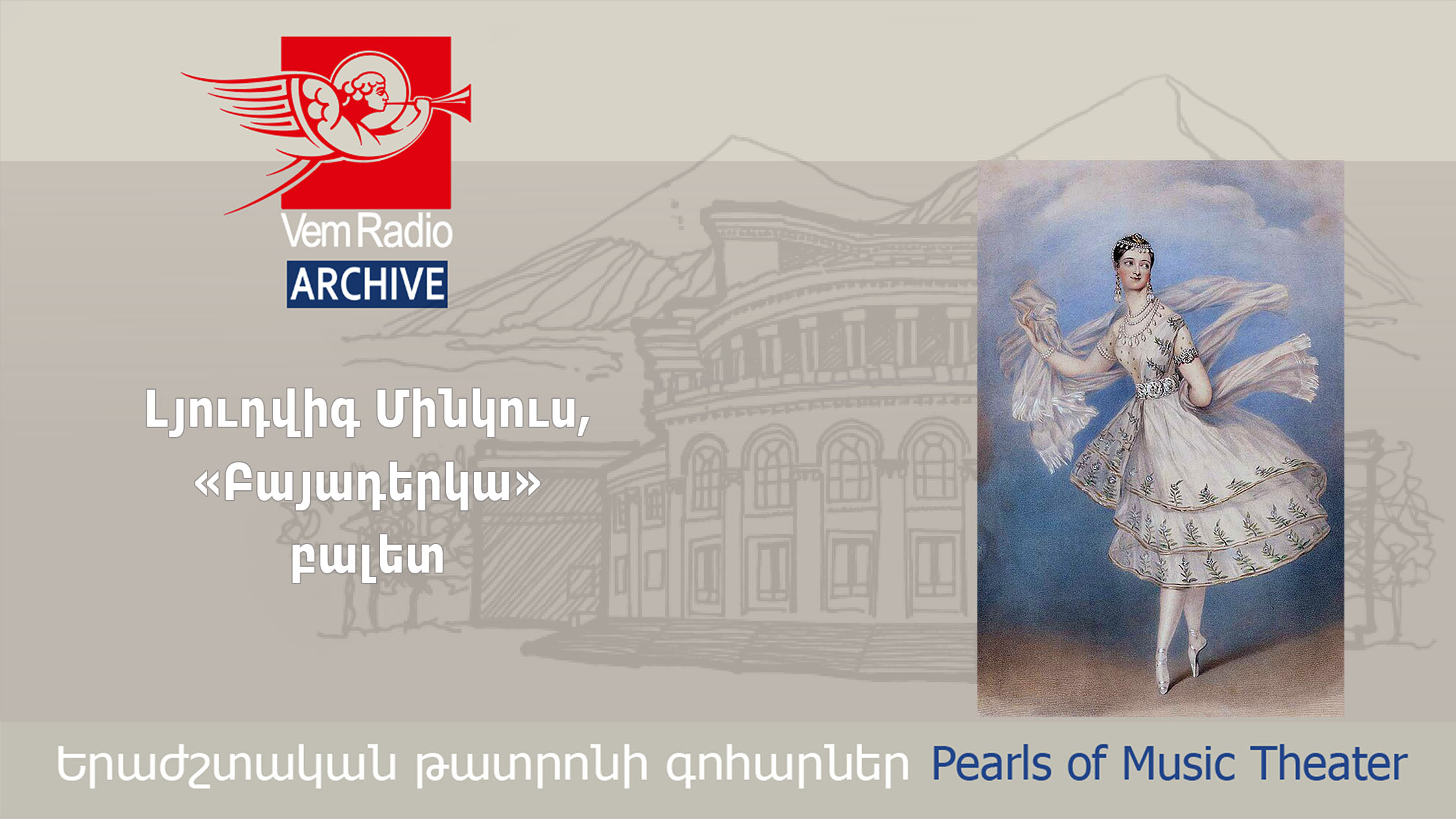
Ludwig Minkus, La Bayadère (ballet)
In 1876, Marius Petipa was attracted by the idea of the ballet "La Bayadère." Sergei Khudekov developed the plot based on "Shakuntala, or The Sign of Shakuntala" by the ancient Indian poet Kalidasa. However, the original source of Petipa's ballet wasn't this ancient drama, but the French ballet "Shakuntala" by T. Gauthier.
The Austrian composer Ludwig Minkus's ballet “La Bayadère” was premiered on February 4, 1877, at the Bolshoi Theater in St. Petersburg. Then the play disappeared from the repertoire for more than a decade. In 1941, a great expert on the classical heritage, Vladimir Ponomarev, and the young choreographer Vakhtang Chabukiani jointly created a three-act version of the old play. In 1948, this version was replenished and since then has not descended from the theater stage.

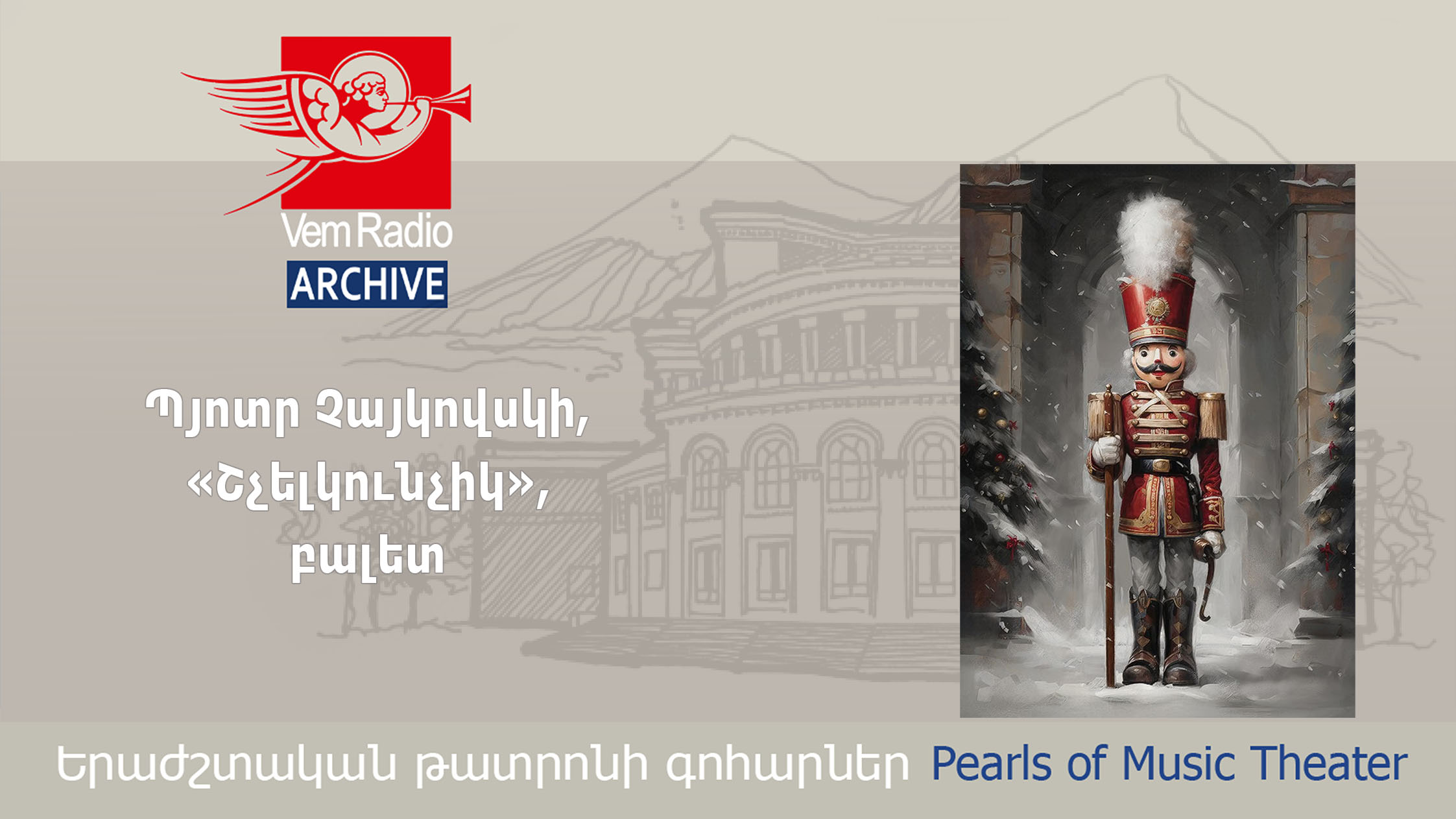
Pyotr Tchaikovsky, "The Nutcracker" (ballet)
The plot of Tchaikovsky's ballet "Тhe Nutcracker" was borrowed from the tale "The Nutcracker and the Mouse King" by Ernst Theodor Amadeus Hoffmann. But the libretto is based on the tale "The Story of the Nutcracker" by Alexander Dumas the Father (1844), which was wrongly attributed to Alexander Dumas the Son in the "Theatrical Encyclopedia." Tchaikovsky worked on the creation of the ballet with popular ballet master Marius Petipa. The premiere took place on December 6, 1892, at the Mariinsky Theater along with the Opera "Iolanta."

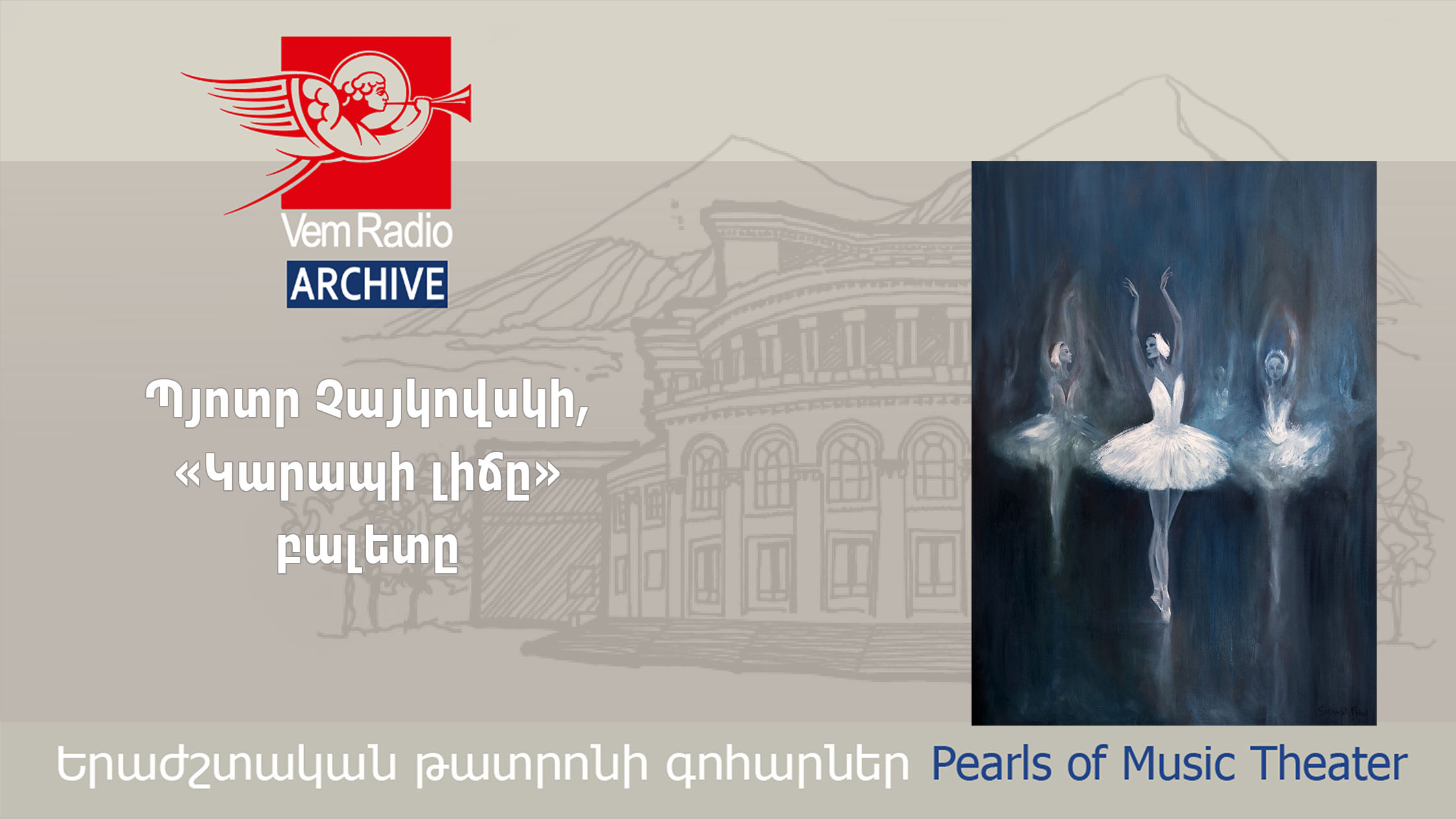
Pyotr Tchaikovsky, Swan Lake
Libretto was written by Vladimir Begichev and Vasily Geltser.
“Swan Lake” was premiered in February 1977 and met by the public not very well. The experts of that time considered it unsuccessful, and it was soon removed from the scene. The main culprits were considered choreographer Vatslav Reisinger and Polina Karpakova, who performed the role of Odette.
After almost twenty years, the Directorate of Imperial Theaters again turned its attention to Tchaikovsky's work to include it in the new season of 1893-1894. Thus, a new script of the play was developed by famous Marius Petipa. The composer's brother, Modest Ilyich, remade the libretto.
The new premiere took place in January 1895 in St. Petersburg. Since that time, the ballet has received a well-deserved recognition among both the public and music critics.


Franz von Suppé, Boccaccio, or the Prince of Palermo
The authors of the libretto of Suppé's operetta are Friedrich Zell and Richard Genée. The plot is based on some novellas from the collection “Decameron” by Giovanni Boccaccio, which were masterfully united in such a way that the main character became Boccaccio himself.


Francesco Cilea, Adriana Lecouvreur
In April 1849, the five-act drama by Eugène Scribe and Ernest Legouvé "Adrienne Lecouvreur" was staged with triumphant success in Paris. Based on this play, Arturo Colautti wrote a libretto for the opera of the same name.
The heroine of the opera is a historical character, an actress of the French Comedy Teather, Adriana Lecouvreur, famous for her roles in Racine's tragedies.
The opera was premiered at Milan's Teatro Lirico on November 6, 1902.

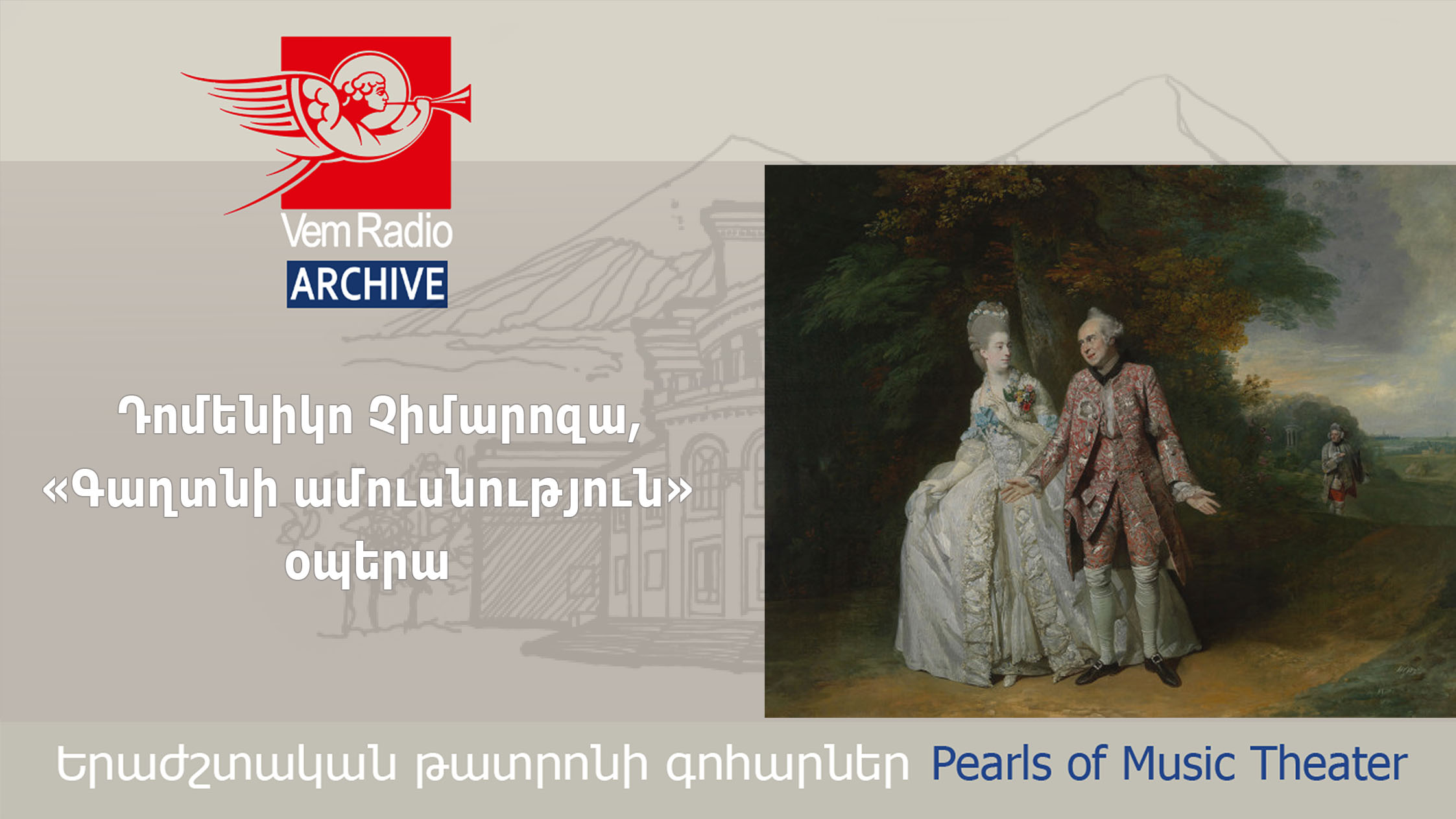
Domenico Cimarosa, The Secret Marriage
The plot of the “Secret Marriage” is borrowed from two plays. One of them, "The Clandestine Marriage," belongs to two famous English authors: George Colman the Elder and David Garrick. The other play is "Sophie, or Hidden Marriage" by French actress and novelist Marie-Jeanne Riccoboni. The libretto was written by Giovanni Bertati.
The premiere of the opera took place on February 7, 1792, in the Vienna Burgtheater and was an exceptional success. Emperor Leopold II liked it so much that he demanded its immediate repetition. After a dinner, the singers repeated the performance specially for the Emperor and courtiers.

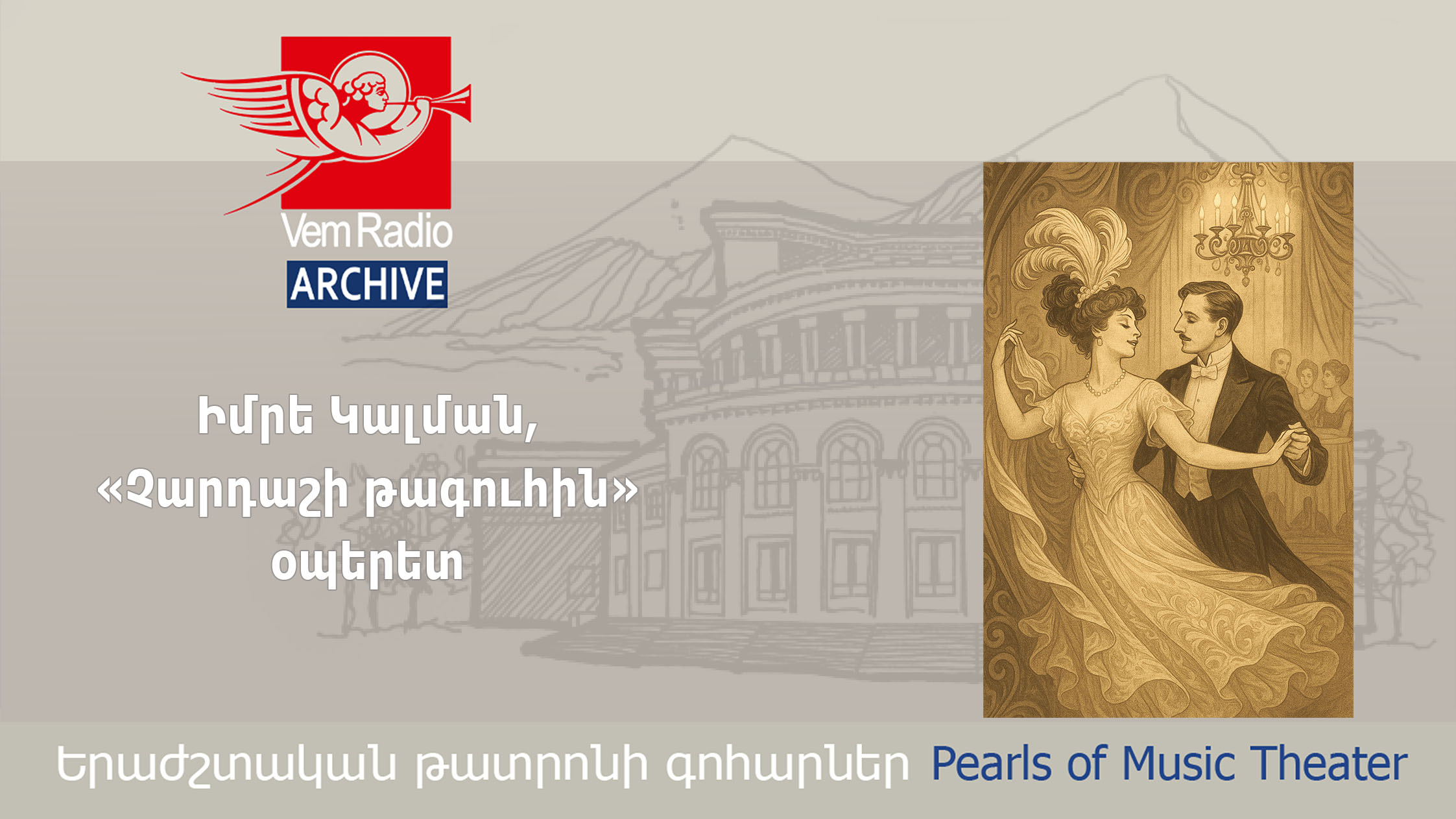
Imre Kalman, Die Csárdásfürstin (The Csárdás Princess)
The libretto of this operetta was written by the Austrian playwright Leo Stein and librettist Bela Jenbach. Kalman conceived the idea of creating an operetta dedicated to the variety star Sylva Varescu in the beginning of 1914. The German libretto was called "Long live love."
The operetta was completed by November 1915, and its premiere took place on November 17 at the Johann Strauss Theater in Vienna.
The first staging of the operetta in Russia was in the midst of the World War I (1916), so both the title of the operetta and many of the names of the characters were changed. Since then, the Soviet and Russian audience have known this operetta as "Silva."

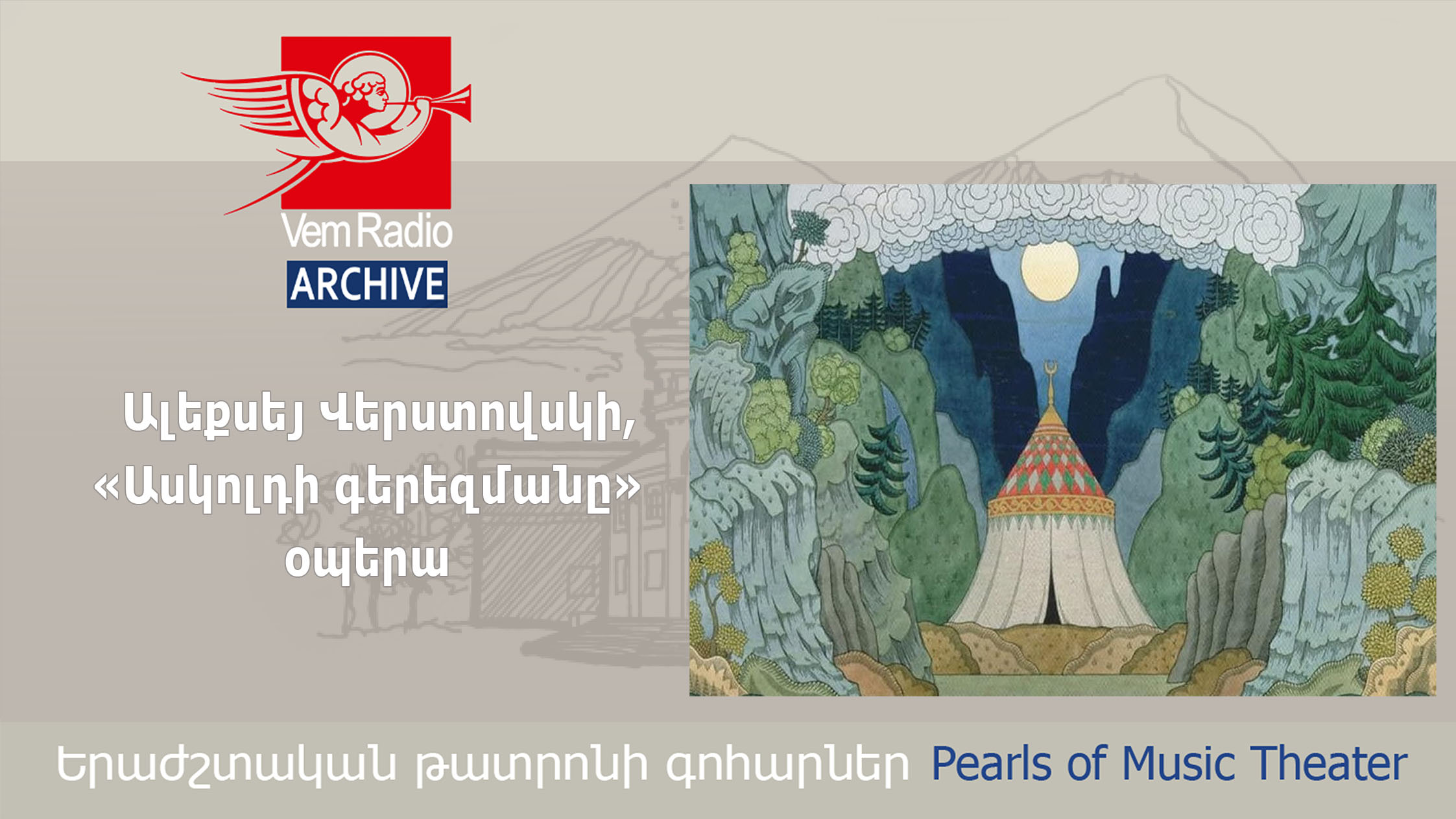
Alexey Verstovsky, Askold's Grave
The author of the libretto of this opera is well-known Russian writer and playwright Mikhail Zagoskin. His novel "Askold's Grave" that was published in 1833 received appreciation by neither critics nor readers. However, two years later, in 1825, Alexey Verstovsky decided to write an opera based on this novel.
The opera was premiered on September 15, 1836. The audience highly appreciated it. The opera was presented in Moscow Bolshoy Theater over 400 times in 25 years, and until 1887, it was in the permanent repertoire of the Theater.

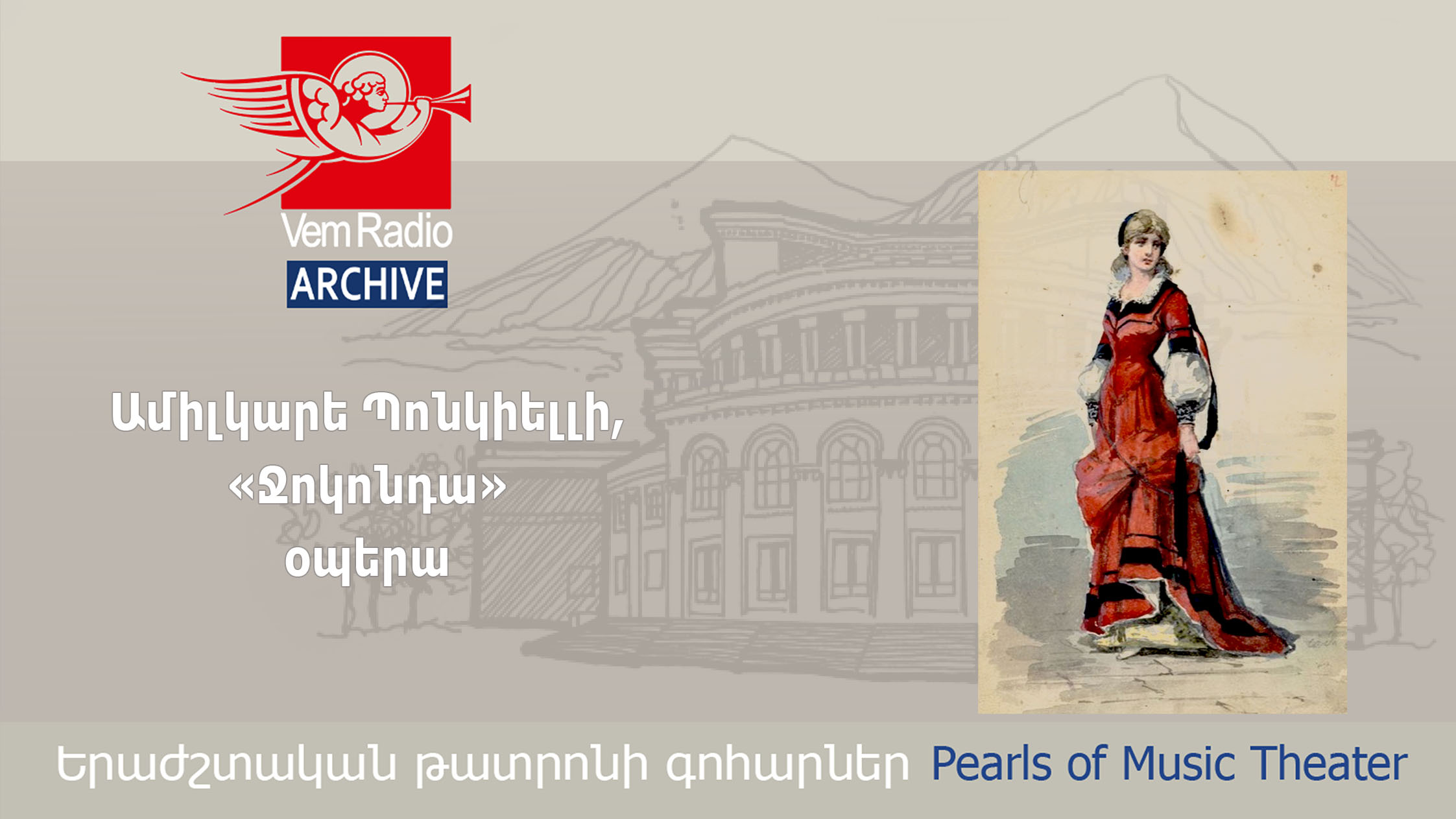
Amilcare Ponchielli, La Gioconda
The author of the libretto of the Italian composer Amilcare Ponchielli’s opera “La Gioconda” is the well-known Italian composer and poet Arrigo Boito who wrote it under the pseudonym Tobia Gorrio. The plot is based on the drama "Angelo, Tyrant of Padua" by Victor Hugo. "La Gioconda" was premiered on April 8, 1876, in La Scala, Milan.

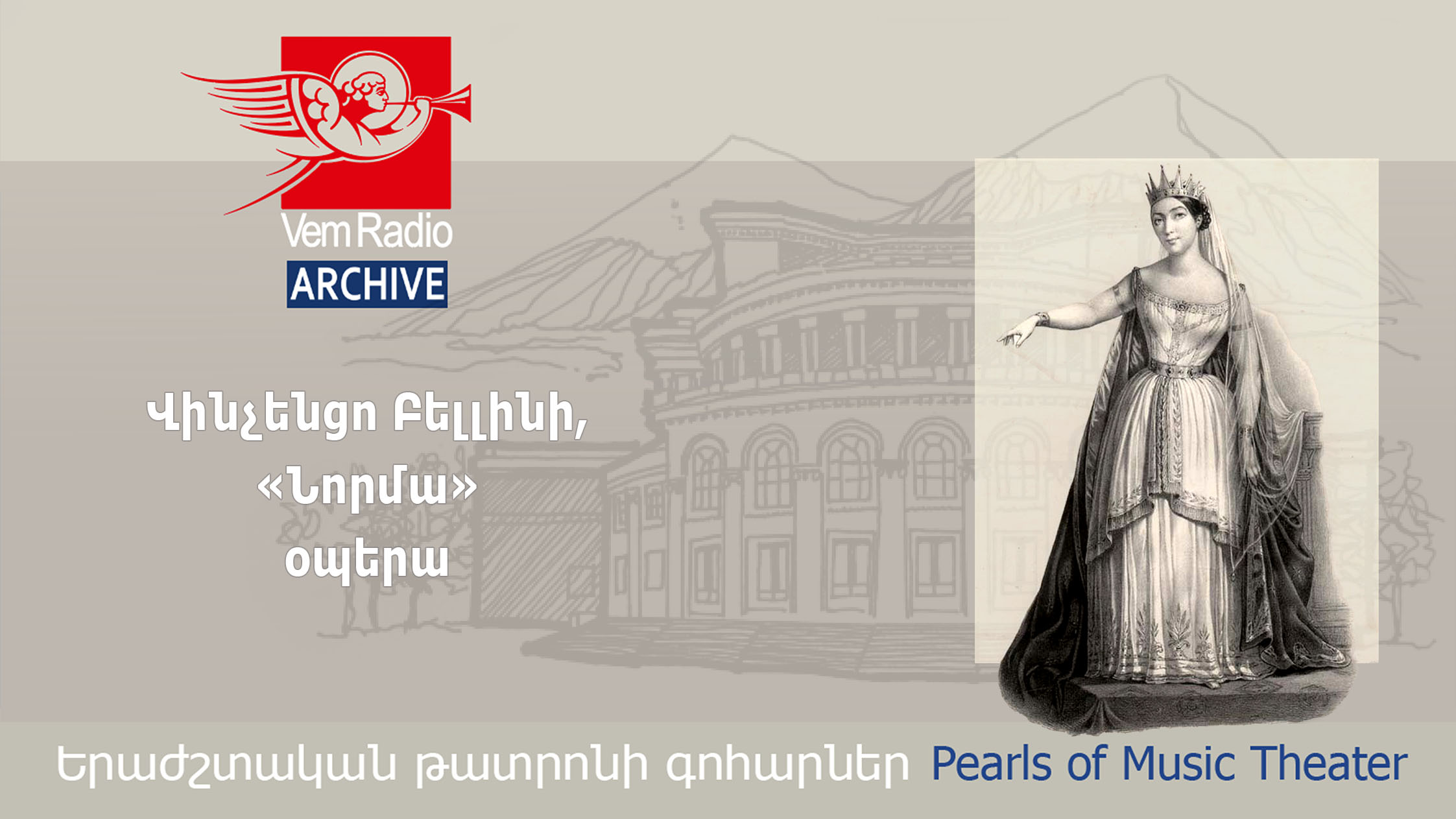
Vincenzo Bellini, Norma
The Italian libretto was written by Felice Romani on the basis of the tragedy "Norma, or the Infanticide" by French dramatist Louis Alexandre Soumet.
Bellini completed the music for the opera 20 days before the premiere. At the request of the composer, the rehearsals also continued in the morning on the day before the premiere. Because of this, all the soloists were very tired, and as a result, the premiere that took place on December 26, 1831, failed. Bellini called this performance a "real fiasco." But on the next day, December 27, the audience appreciated the opera, applauding even during those scenes that had been especially poor on the previous evening. From that day on, Bellini’s "Norma" began its triumphal procession in the world's opera houses.

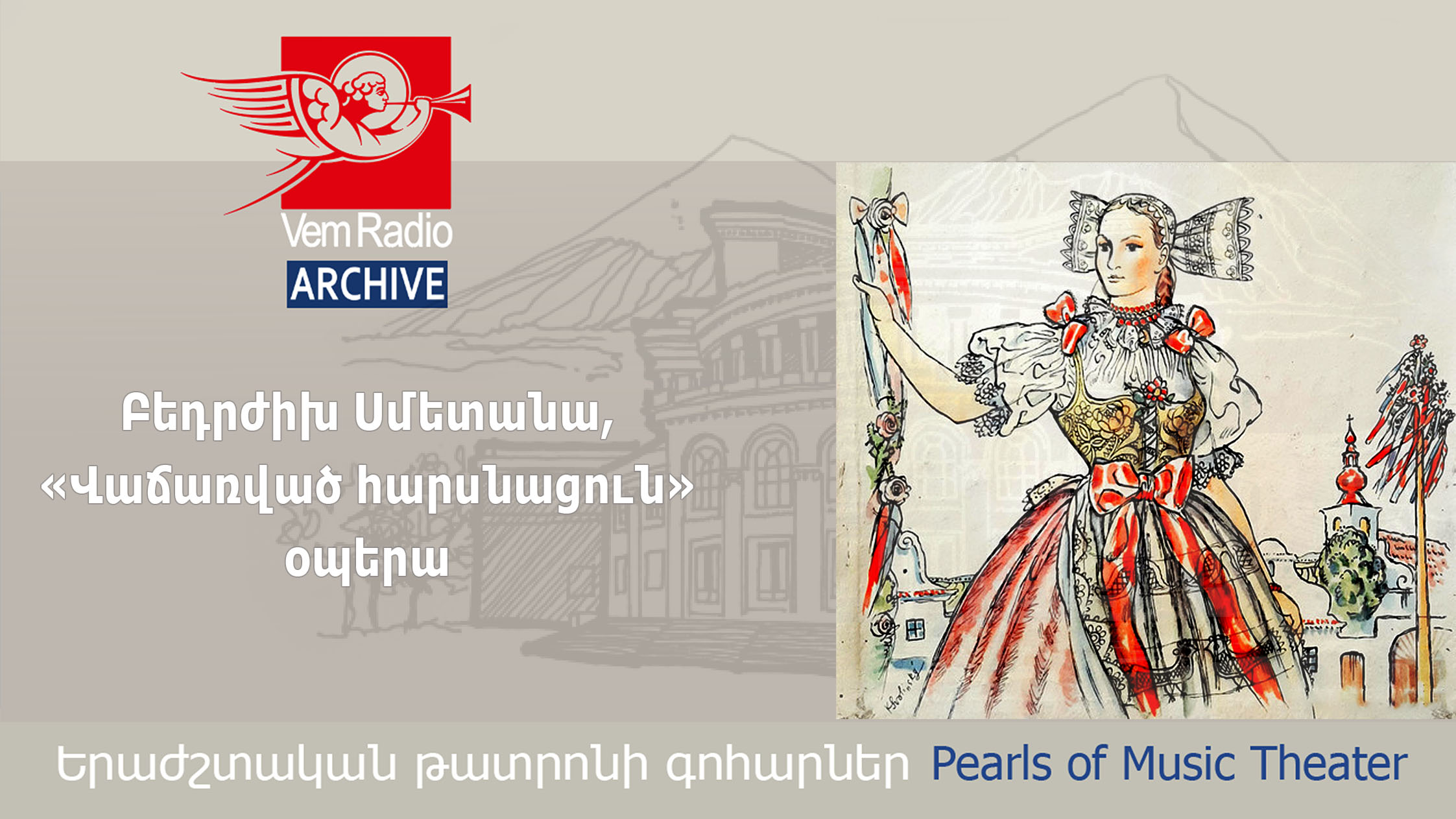
Bedřich Smetana, The Bartered Bride
Czech composer Smetana began to write this satirical Opera in 1863. The author of the libretto was the famous Czech writer Karel Sabina. The initial version of the libretto written only for a single act did not satisfy the composer. At his request, the libretto was expanded to two acts. Smetana finished the music for this version in 1866. On May 30 of the same year, the Opera was premiered at the Provisional Theater in Prague. In 1870, Smetana changed the Opera to be presented in St. Petersburg. He partially modified the text of the Opera and created several new musical episodes. This new version consisted of three acts and continues to be presented to the audience in this form.

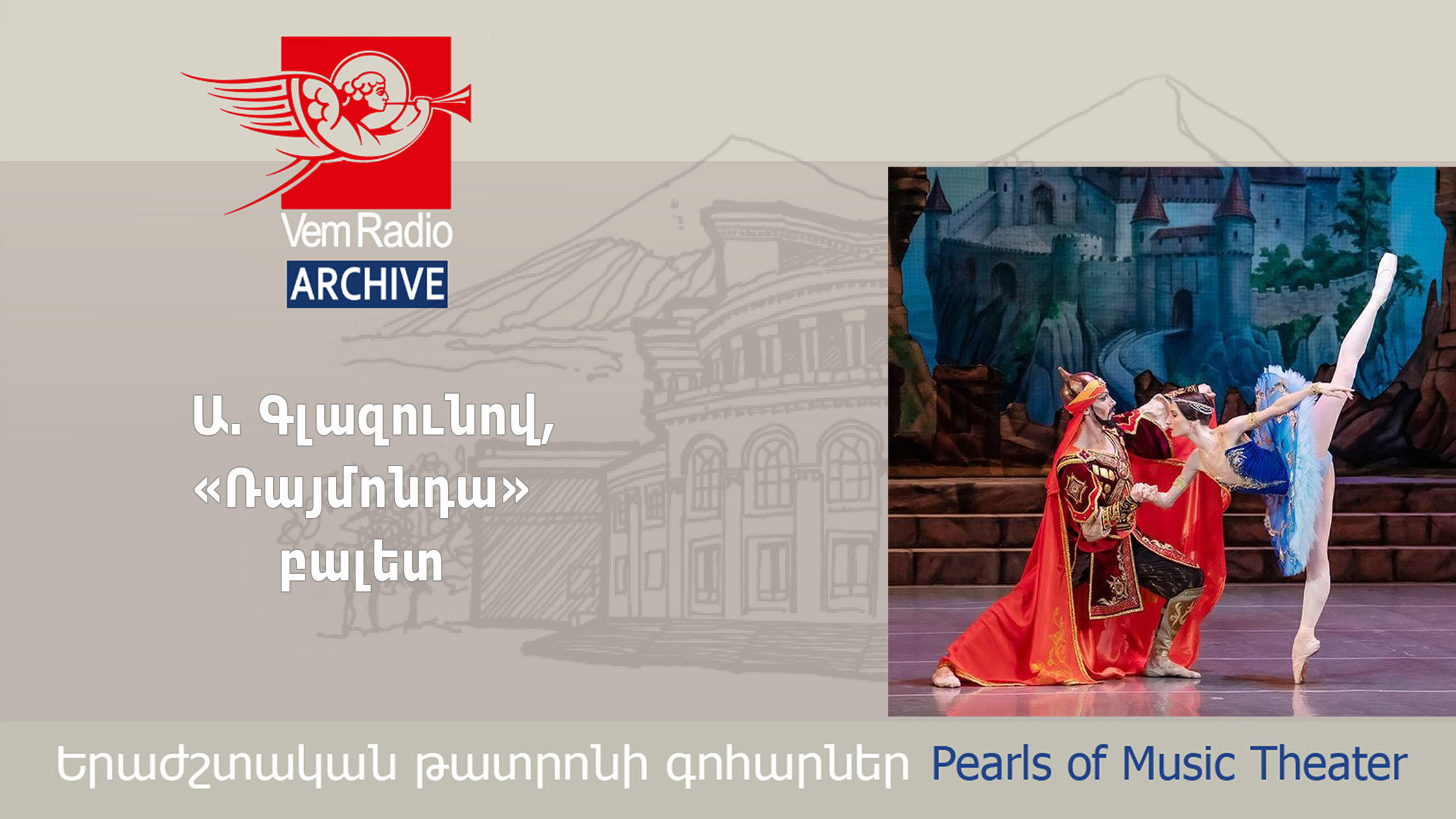
Alexander Glazunov, Raymonda
In 1896, the Director of the Imperial Theaters of St. Petersburg Ivan Vsevolozhsky commissioned Glazunov to write music for the ballet Raymonda. The author of the idea of the playscript was Marius Petipa, a 19th-century leading choreographer, and the libretto was written by Russian writer Lidiya Pashkova. The premiere of the ballet took place on January 7, 1898, at the Mariinsky Theater in St. Petersburg.

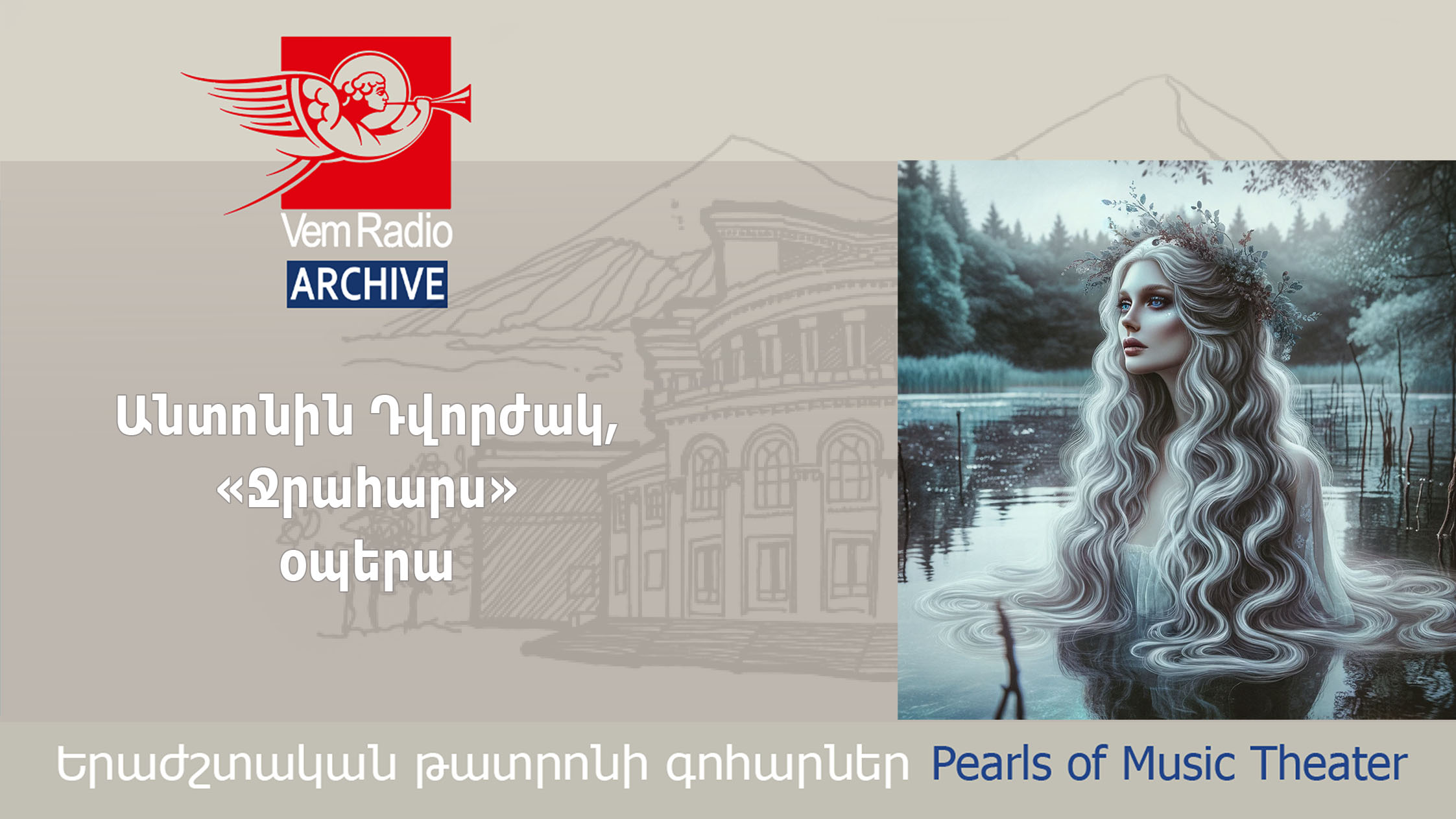
Antonín Leopold Dvořák, Opera Rusalka
The Czech poet, dramatist, and theater figure Jaroslav Kvapil created the libretto of “Rusalka” on the basis of fairy tales by Karel Jaromír Erben and Božena Němcová. This story of all-conquering love immediately attracted the attention of the Czech composer Dvořák, and already on 31 March 1901, the Opera “Rusalka” was presented to the audience.

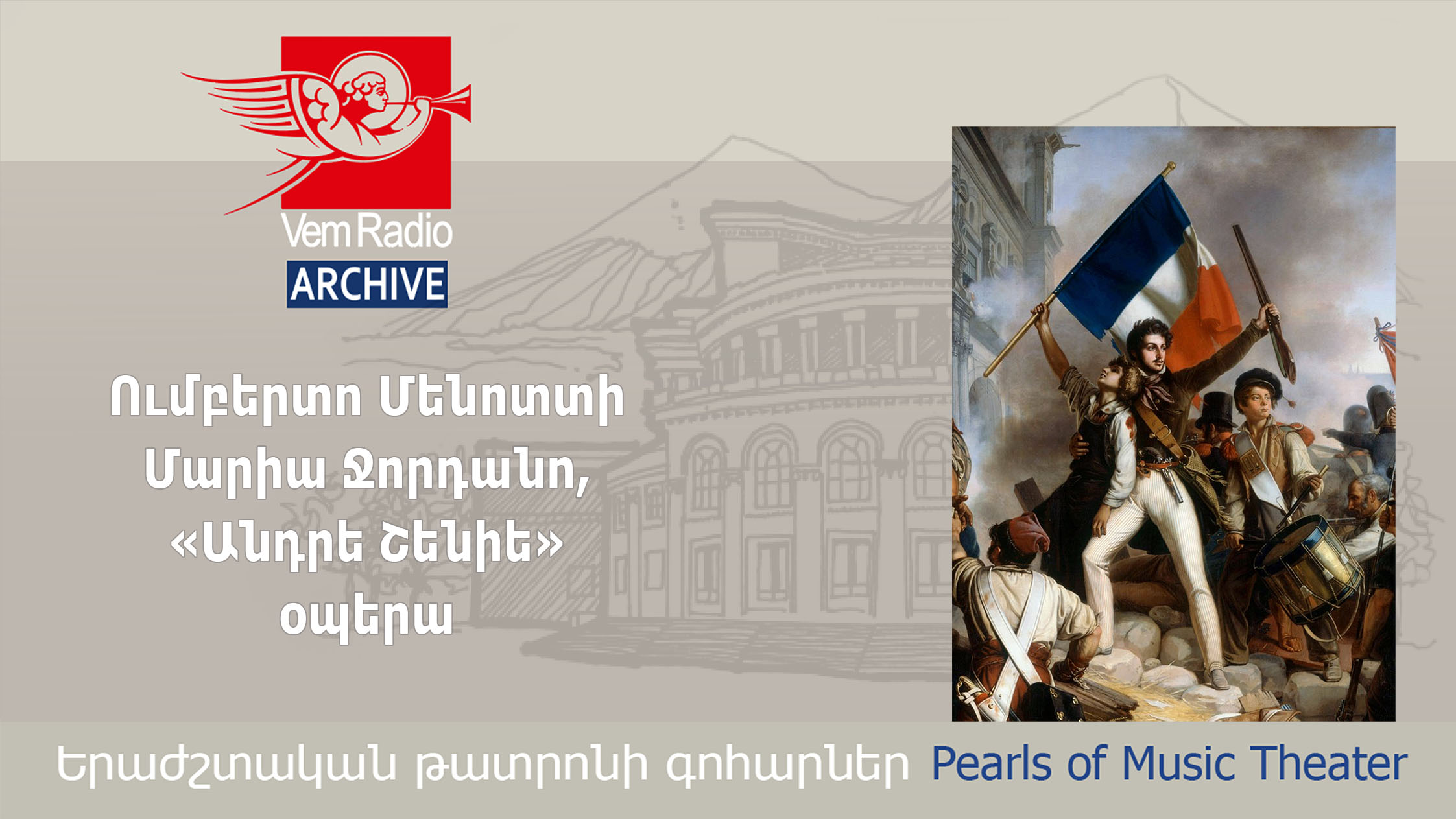
Umberto Menotti Maria Giordano, Andrea Chénier
The author of the libretto is Luigi Illica. The Opera was premiered on March 28, 1896. The main character of the Opera is the famous French poet Andrea Chénier. At first, he welcomed the Great French Revolution, but later rejected the Jacobin dictatorship and terror, defended the king, and criticized the main leader of the Jacobins Maximilien Robespierre. Because of persecution, the poet tried to flee from Paris two times but was arrested. During the 140 days that he spent in prison, Andrea Chénier wrote his best poems, which inspired Luigi Illica in writing the libretto. On July 25, 1794, Chénier was accused of conspiring against the state and was executed on the same day.

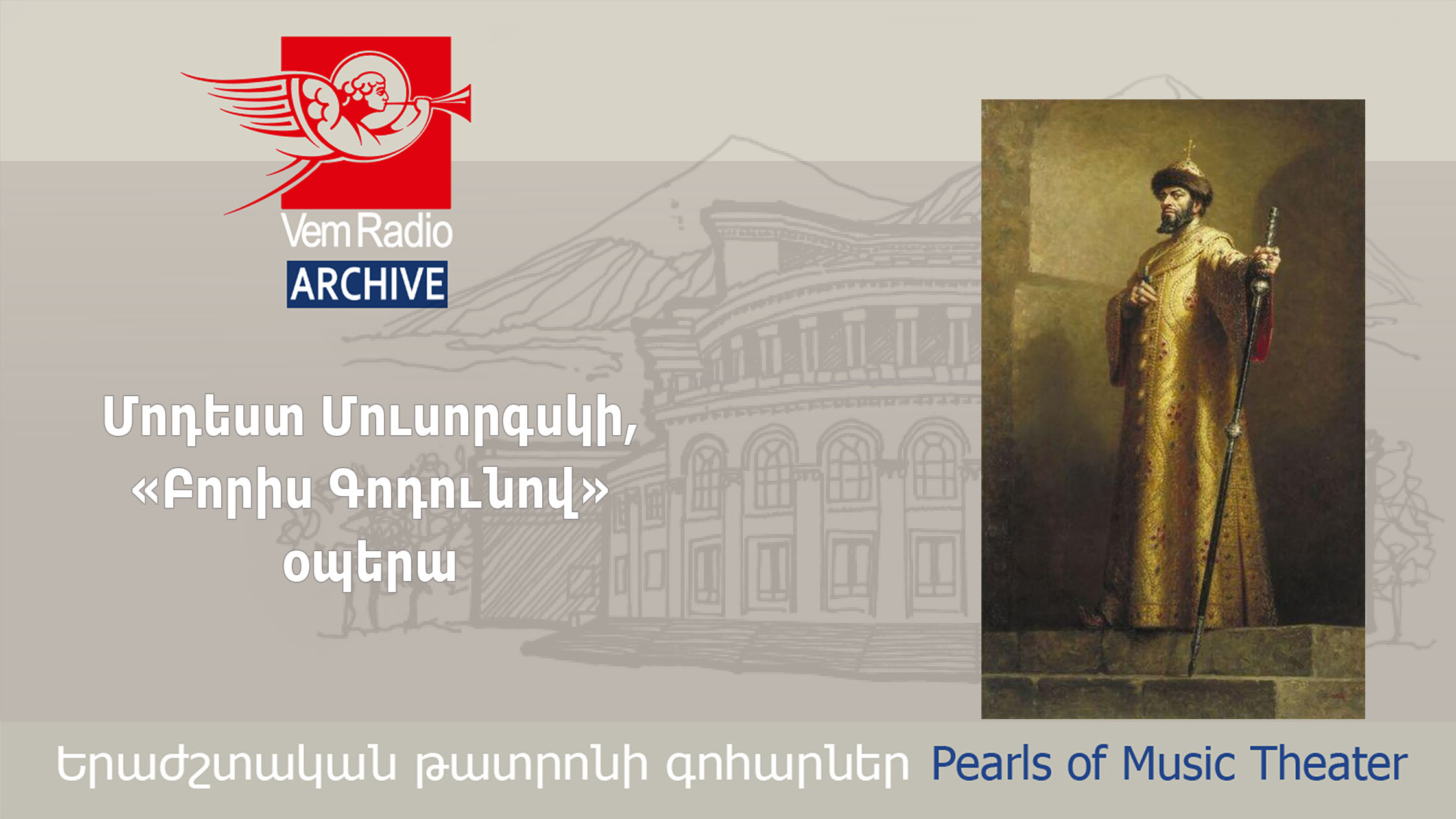
Modest Mussorgsky, Boris Godunov
The libretto is based on the tragedy “Boris Godunov” by Alexander Pushkin, but the composer also used a number of historiographical articles and “The History of the Russian State” by Nikolay Karamzin. Mussorgsky completed the first edition of the opera in 1869 and the second, in 1872. The premiere of the opera took place on January 27, 1874, at the Mariinsky Theater in St. Petersburg.

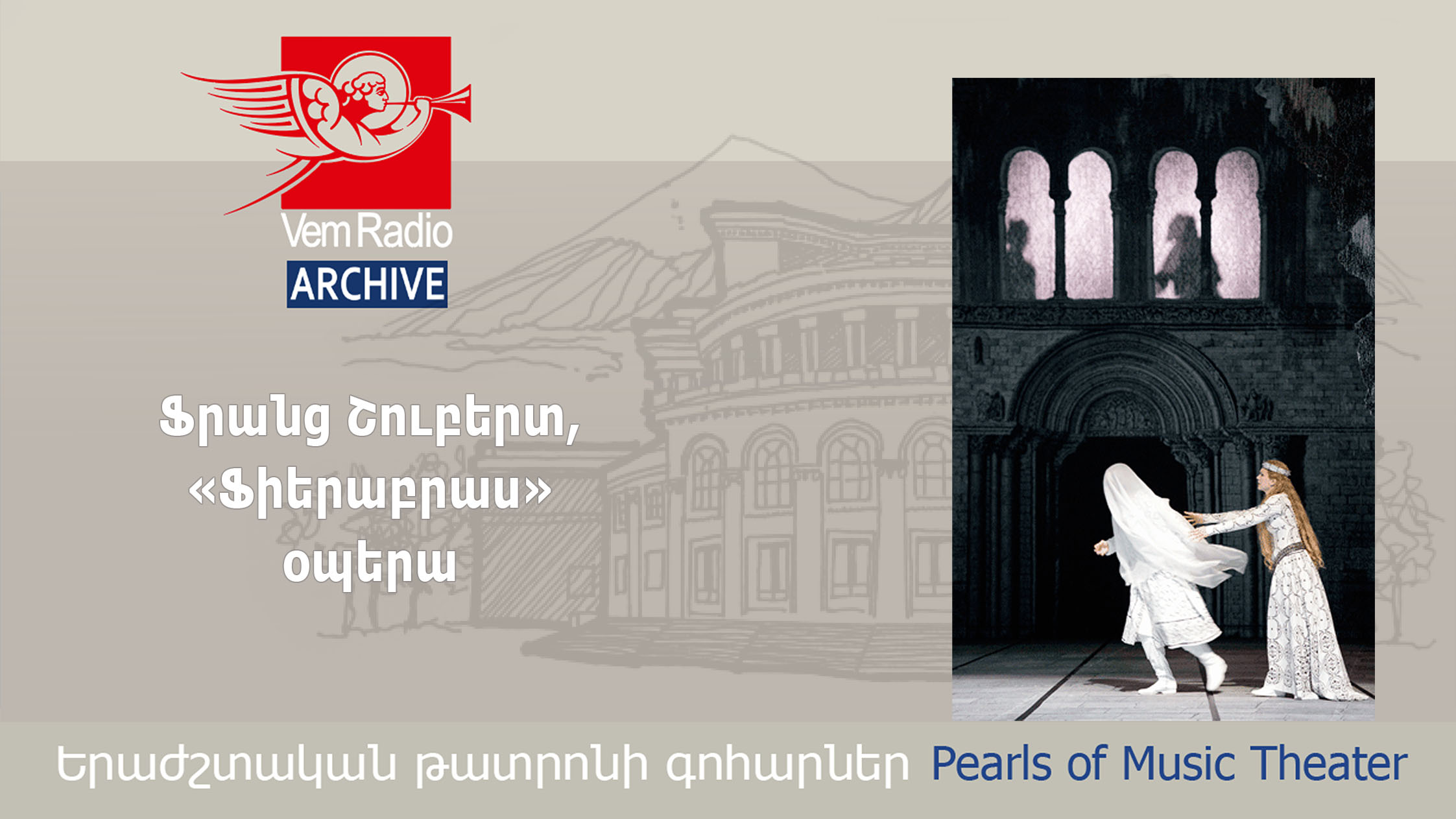
Franz Peter Schubert, Fierrabras
In 1822, the management of the Vienna Royal Opera House commissioned Franz Schubert to write an opera. Schubert chose a libretto by Joseph Kupelwieser that was based on sayings about Charlemagne, the king of the Franks, and the Moorish knight Fierrabras. But the management of the theater abandoned its decision to stage this opera by Schubert.
The composer never saw this opera staged; he wasn't even paid for his work. Seven years after his death, on May 7, 1835, the opera was presented at Vienna's Theater in der Josefstadt in a shortened concert version. In 1897, Austrian conductor and composer Felix Mottl staged his version of the opera at the Baden State Theater; he had added ballet parts from other works of Schubert and had also used some parts from works by other composers. The Mottl version was performed for a long time in opera houses. The authentic and full version of the opera was first presented at the Vienna State Opera in 1988 under the direction of conductor Claudio Abbado.